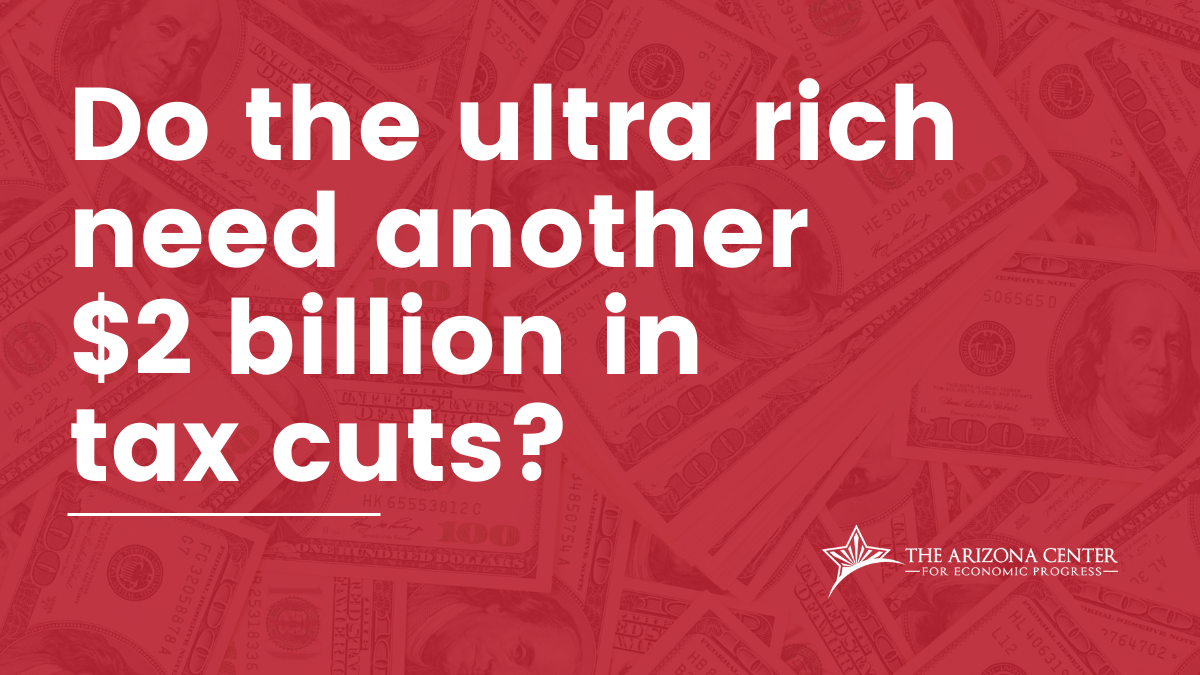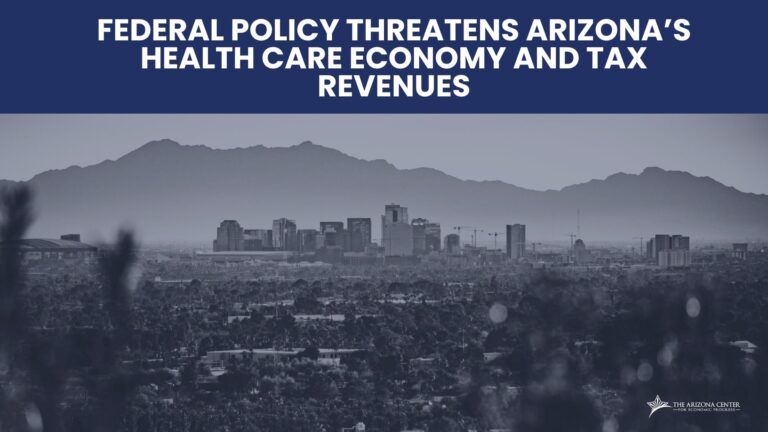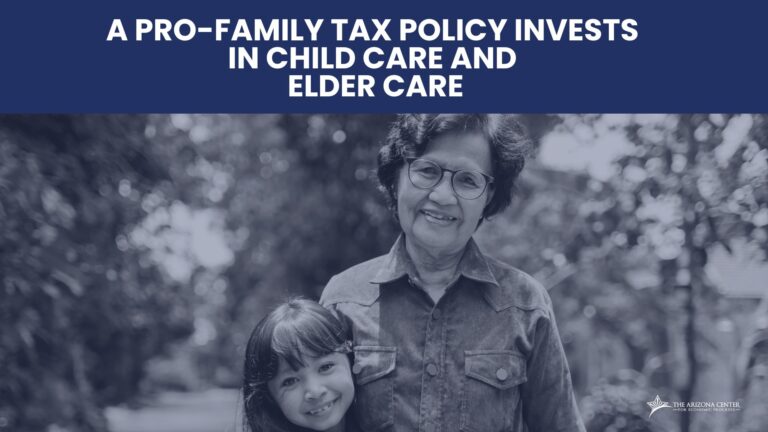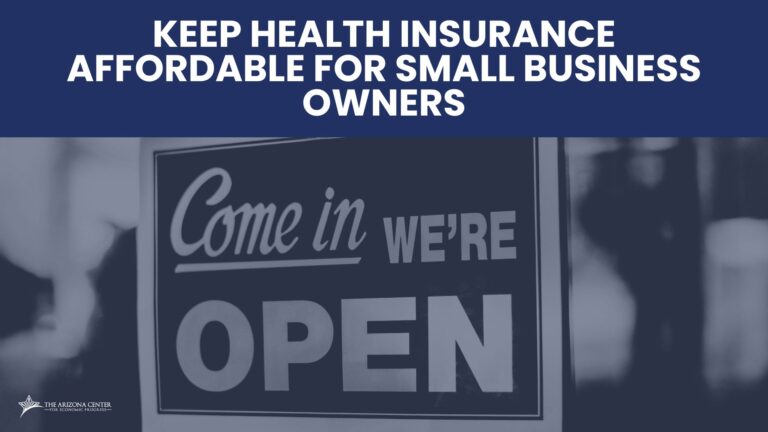
$2 Billion Tax Cuts for the Rich are Irresponsible
Last year, the legislature passed huge tax cuts whose benefits will only be seen by the richest Arizonans. Right now, Arizona’s finances are healthy with an expected $5 billion surplus. But this sunny forecast is in danger. Inflation is increasing. More and more economists are expecting a recession within the next year or so. The $5 billion surplus could evaporate very quickly.
Once these new tax cuts go into effect, they will reduce state revenues by an estimated $2 billion a year. Combined with the increasing costs, this will make it almost impossible to adequately invest in public education or provide the resources many Arizonans count on. Investments voters have repeatedly said they prioritize. The Arizona Supreme Court recently denied Arizona voters the right to have the final say on whether those tax cuts should go into effect by striking down a referendum on the issue. Enacting these and other tax cuts at this time is fiscally irresponsible as the state’s current revenue surplus is likely inflated and deceptive, and giving away such a significant portion of state revenue in the form of tax cuts to the rich will likely result in cuts to education and other important resources when the next recession comes. Lawmakers need to reject the temptation to cut taxes. Instead, they need to use the current surplus to prepare our state for the future.
Instead of Cutting Taxes, Arizona Should Use Increased Revenues to Prepare for the Next Downturn
Economists have been warning about a potential recession. Former Treasury Secretary Lawrence Summers has cautioned that today’s economic conditions – rising inflation and low unemployment – make a recession by next year very likely. Deutsche Bank economists are projecting a recession by the end of 2023. Even with the state’s $5 billion surplus, local economists caution that the state will see at least a mild recession within the next two to three years.
Increased Revenue from Significant Infusions of Federal Dollars is Temporary but Tax Cuts are Permanent
Normally, Arizona state government receives between $16 and $17 billion in federal funds in a year. Since 2020, Arizona received an extra $12.3 billion to deal with the impact of Covid-19, with another $1.4 billion going directly to local governments. Some of these dollars repaid the state for costs associated with the pandemic. Most of the dollars, however, are new, meant to address issues brought on by the pandemic: K-12 enrollment stability, deposit into the unemployment insurance trust fund, and a host of other purposes. None of this $12.3 billion will be ongoing. We cannot rely on it to cover the needs of the state.
In addition to the $12.3 billion, Arizona also received more than $1 billion in one-time Child Care Development Block Grant dollars. These dollars are being used to increase childcare rates, expand childcare services to families who would not normally qualify, and help childcare centers directly. This significant infusion into the childcare system meant centers could remain open and parents could return to work. Once these funds are exhausted, however, they will not be replaced. If the state wants to avoid cutting the current rates and reversing the eligibility expansion, it will need state General Fund dollars to replace the one-time federal funds.
Revenue Forecasts Made During the Pandemic Were Off
Financial help for individuals and businesses meant tax collections did not fall as had been expected. Originally, tax revenue was expected to fall as people lost their jobs and businesses closed. However, more than $6 billion in stimulus checks went to families and individuals. Businesses received more than $12 billion from the Paycheck Protection Program. Altogether, individuals and businesses received $42 billion directly from the federal government.
Instead of the deficits projected in April 2020, Arizona now has a General Fund surplus of more than $5 billion. The question is: What will happen when these federal dollars are gone?
Fixing a Bad Tax Cut Idea is Nearly Impossible
One thing we know for sure: Arizona shouldn’t be using today’s General Fund surplus for tax cuts. More than half of the $5 billion surplus is temporary; tax cuts are permanent. Tax cuts are easy to pass – they need only a simple majority. Tax cuts are also popular with many of our legislators - Arizona’s legislature has passed some kind of tax cut every year since 1990, with two exceptions (2003 and 2020). But, reversing tax cuts or any other kind of tax increase requires a 2/3 vote of the legislature and are difficult for most legislators to support. For example, even during the last recession when revenues fell by one-third and legislators were taking all kinds of extreme actions like mortgaging the Capitol buildings to raise revenue, some legislators could not bring themselves to directly pass even a temporary tax increase. Instead, they referred to the voters a 1-cent sales tax that raised $1 billion a year to help cushion the impact of the recession. Some of the tax cuts passed in recent years are not yet fully phased in, including the flat tax which will cut revenues by $2 billion.
Dollars Used for Tax Cuts are Unavailable for Education and Other Priorities
Instead of more tax cuts, legislators need to use the surplus to invest in education. Nearly everyone agrees that education, from kindergarten to advanced degrees, is a priority for creating a workforce that will attract new employers and high-paying jobs. The infusion of one-time federal funding into Arizona’s K-12 education system has added approximately $2,000 in per-student funding that won’t be available once the federal funds are exhausted. Maricopa and Pima community colleges still do not receive any operating funding formula dollars after having their state dollars zeroed out during the last recession.
Arizonans also need help beyond education. There is a desperate need for affordable housing. The increasing cost of childcare means many families are considering whether a parent should stay home to save the cost of childcare.
At the April Finance Advisory Committee meeting, economist Jim Rounds noted that after the Great Recession the state implemented major tax policy changes. He cautioned that the policies adopted after the Covid-19 recession should be about the fundamentals. He urged the state to increase the number of high school graduations, trade school certifications, and community college and university degrees. “If all we do is catch up to the national average for graduation, that means the state gets another $5 billion over the next 10 years.” He warned about the “grand bargain” the Arizona legislature is considering: the state needs to be very careful about how it spends its ongoing money.
Most Tax Cuts Don’t Benefit Everyday Arizonans
Tax cuts passed during the last few legislative sessions went to insurance companies, commercial property owners, and retired veterans. Even the flat tax will not result in a meaningful tax cut for most Arizonans – households making $64,000 per year will get an average $47 per year tax cut.
Everyday Arizonans don’t want tax cuts for the rich. They want investments in our collective future: education, affordable housing, health care, infrastructure, and other supports needed to build thriving communities and better economic opportunities for all Arizonans.



